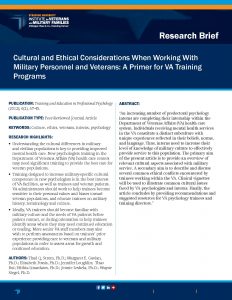Original Publication
Training and Education in Professional Psychology (2012); 6(2), 67-75
Publication Date – September 06, 2013
Publication Type – Peer-Reviewed Journal Article
Authors:
Research Highlights
• Understanding the cultural differences in military and civilian populations is key to providing improved mental health care. New psychologists training in the Department of Veterans Affairs (VA) health care centers may need significant training to provide the best care for veteran populations.
• Training designed to increase military-specific cultural competence in new psychologists is in the best interest of VA facilities, as well as trainees and veteran patients. VA administrators should work to help trainees become sensitive to their personal values and biases toward veteran populations, and educate trainees on military history, terminology and culture.
• Ideally, VA trainees should become familiar with military culture and the needs of VA patients before patient contact, or during orientation to help trainees identify areas where they may need continued education or reading. More senior VA staff members may also wish to perform assessments based on trainees’ prior experience providing care to veterans and military populations in order to assess areas for growth and continued education.
Abstract
“An increasing number of predoctoral psychology interns are completing their internship within the Department of Veterans Affairs (VA) health care system. Individuals receiving mental health services in the VA constitute a distinct subculture with unique experiences reflected in their beliefs, norms, and language. Thus, interns need to increase their level of knowledge of military culture to effectively provide service to this population. The primary aim of the present article is to provide an overview of relevant cultural aspects associated with military service. A secondary aim is to describe and discuss several common ethical conflicts encountered by trainees working within the VA. Clinical vignettes will be used to illustrate common cultural issues faced by VA psychologists and interns. Finally, the article concludes by providing recommendations and suggested resources for VA psychology trainees and training directors.”
Implications
For Practice
The cultural differences between military and civilian populations can have an impact on the onset, maintenance and presentation of mental health symptoms. Psychologists and other service providers who provide services to veterans should be aware of distinct subcultural differences, including differences in language, norms and beliefs. By gaining cultural competence relevant to military and veteran populations, psychologists and other clinicians will be better able to adeptly increase the efficacy of their services to this population. New VA trainees, including both psychologists and clinicians, should be aware of the beliefs and values of each military branch to better understand the potential stressors of differing military service members, veterans and their families. In addition, psychologists need to be sensitive to the hyper-masculine culture prevalent throughout much of the military experience, as it may be extremely difficult for a service member or veteran to seek out services in light of these cultural values. Addressing these fears can increase the likelihood that the service member/veteran would return for services. In one example, psychologists who are better able to understand military terminology (i.e. Military Occupational Specialty or MOS) become less likely to miss important information in determining a diagnosis. While the VA does provide adequate cultural training to the psychologists and interns serving this population, training designed to help new clinicians understand these cultural differences could be greatly beneficial and ensure more effective services.
For Policy
Policy makers should work with VA officials to ensure proper training for new VA clinicians and psychologists in all VA health care centers before they interact with veteran patients. Structured training of new trainees in VA centers focused on cultural competence can include lectures, case studies, role plays, guest speakers, video presentations, and community outings to familiarize trainees with military culture, terminology, rankings and job codes. In addition, current policies allow commanding officers access to the mental health records of their subordinates (for active-duty members), which can lead to military members attempting to hide their symptoms. Revisiting this policy could potentially improve treatment for active military members by making them more likely to acknowledge symptoms and seek treatment. Until this policy is revisited, practitioners and clinicians need to be aware of the military structure and confidentiality rules to ensure that patients are aware of their confidentiality rights.
For Future Research
Few researchers have focused on the effectiveness of cultural competency training programs for psychologists and clinicians that provide services to military members receiving services within the VA. Future research could evaluate such training programs within the VA and in other clinical settings to determine whether increased knowledge of military culture, demographics, structure, value and beliefs leads to more effective treatments, and higher patient retention and satisfaction. Researchers should also examine whether increased military knowledge among health providers leads to equally beneficial results among both men and women veterans in VA centers. Future studies focusing on cultural competency and the impact of cultural competency on quality of care can be greatly beneficial to veterans receiving care at VA centers. Researchers should continuously evaluate these programs to determine their efficacy.

